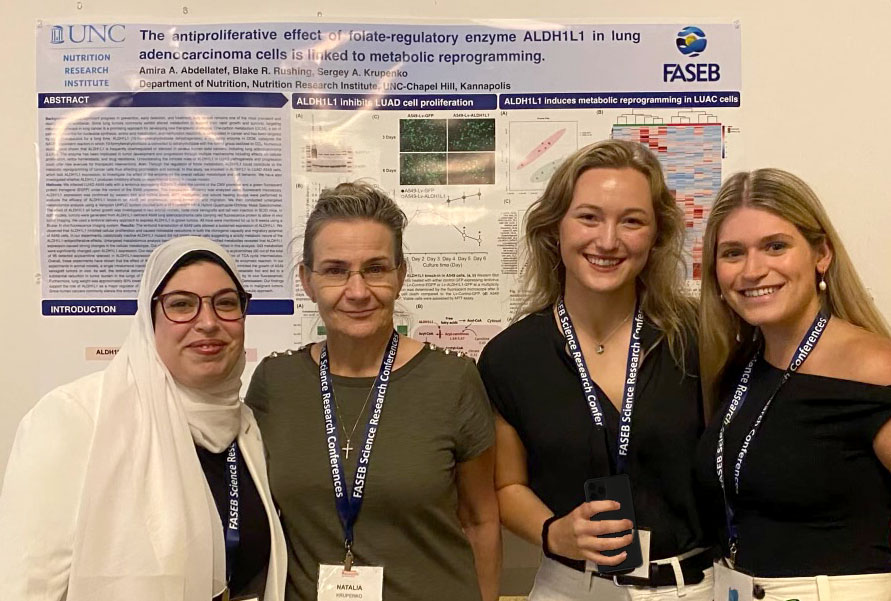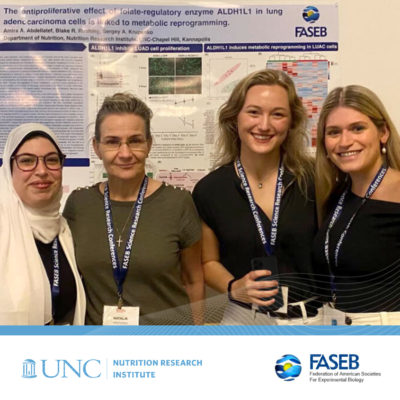Natalia Krupenko, PhD, an associate professor at the UNC Nutrition Research Institute, served as co-chair for the FASEB Science Research Conference on B Vitamins and One-Carbon Metabolism, in Niagara Falls, New York. As one of the leading forums in the field, this conference brings together scientists and clinicians to discuss the latest research and forge new collaborations. With over 35 years of history, it remains a critical event for advancing knowledge in B vitamins and one-carbon metabolism.
What is one-carbon metabolism?
One-carbon metabolism is a key biochemical pathway in our cells where single-carbon units are transferred between molecules. This process is vital for making and repairing DNA, producing amino acids for proteins, generating cellular energy, and detoxifying harmful substances. Proper function of one-carbon metabolism is crucial for cell growth, maintaining genetic integrity, and overall health. Disruptions in this process can lead to health issues and increased disease risk.
Krupenko’s role as co-chair was instrumental in shaping this year’s program, which featured a broad range of topics, including the influence of B-vitamins on neurodevelopmental and psychiatric disorders, innovative treatments for metabolic diseases, and public health approaches to addressing micronutrient deficiencies. The keynote addresses were delivered by Edward Quadros, PhD, of the State University of New York (SUNY) and Ruma Banerjee, PhD, of the University of Michigan Medical Center, both world-renowned leaders in this specialized field.

Left to right: Amira Abdellatef, PhD; Natalia Krupenko, PhD; Madeline Hall Childress; Halle Fogle
UNC NRI graduate students and post-doctoral researchers took part in the conference’s poster sessions, showcasing their latest research. The event also featured short talks by some of these emerging scientists. Madeline Hall Childress, a fourth-year doctoral student, received first place in the poster competition for her research on the role of folate in promoting human health and preventing disease.
Throughout the conference, participants engaged in discussions on critical issues in B-vitamin and one-carbon metabolism research, including recent developments in metabolomics and emerging public health strategies. Workshops designed for early-career investigators provided professional development opportunities, covering essential topics such as grant writing and establishing independent research careers.
“The FASEB Science Research Conference brings together basic scientists, physician-scientists, epidemiologists, and public health experts from around the world to present, discuss, and evaluate new data and identify new challenges in the field,” said Krupenko. “The meeting adopted a broad, inclusive, and integrative approach that fosters consensus and promotes new studies, making it one of the most important and influential conferences in the field.”
As the research landscape continues to evolve—with over 9,200 new publications on B vitamins and folate (vitamin B9) in the past 18 months alone—this conference remains a vital gathering for advancing our understanding of the connection between vitamin intake and human health, as well as for fostering the next generation of scientific leaders. For the next conference in this series, scheduled for August 2026, Krupenko will lead the development and organization as chair. She aims to engage more new investigators and students, encouraging them to present their work and develop collaborations that will advance our knowledge of how B-vitamins can support human health.
Natalia Krupenko, PhD, Associate Professor of Nutrition, joined the UNC Nutrition Research Institute in April 2014. Krupenko’s research is focused on the role of folate (vitamin B9) in promoting health and preventing disease in humans. Folate deficiency has been connected with increased risk for neural tube defects, cardiovascular disease and cancer. However, concerns have been raised regarding the adverse effects of over-supplementation with the vitamin. Krupenko’s goal is to determine the best ways to utilize health-protective properties of folate and prevent the possibility of its adverse effects in humans.
FASEB (Federation of American Societies for Experimental Biology) is a federation of scientific societies that advances health and well-being by promoting research and education in biological and biomedical sciences through collaborative advocacy and service to our societies and their members.

